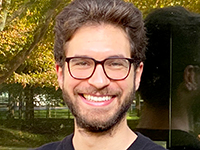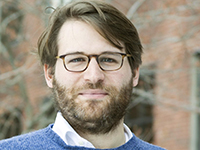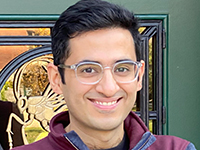Four postdocs in MCB labs have recently been awarded fellowships that will support their research in biophysics, cell biology, and neuroscience.
Two of the postdocs were chosen for NIH fellowships: María Angélica Bravo Núñez of the Murray Lab received a NCI Predoctoral to Postdoctoral Fellow Transition Award, and Navish Wadwha of the Garner Lab and the Berg Lab has been named as a recipient of an NIH Pathway to Independence Award.
Meanwhile, Paul Masset of the Murthy Lab and the Uchida Lab will conduct a project with funding from Harvard’s Mind Brain Behavior Interfaculty Initiative, and Harris Kaplan of the Dulac Lab was designated as an HHMI Fellow of the Jane Coffin Childs Memorial Fund.

María Angélica Bravo Núñez (Murray Lab)
National Institutes of Health F99-K00
María Angélica Bravo Núñez has arrived in the Murray Lab under the auspices of a NCI Predoctoral to Postdoctoral Fellow Transition Award. In 2018, she received the first part of the award, which funded the last two years of her Ph.D. work in Sarah Zanders’ lab at the Stowers Institute.
This year, Bravo Núñez completed the latter portion of the grant while sheltering at home. “One of the upsides of this pandemic was that I had a lot of time to write,” she says. “I finished writing and publishing a paper, I defended my PhD thesis, and I also submitted the K00 section of my grant.”
As a grad student, Bravo Núñez studied selfish meiotic driver genes in yeasts, including a family of genes called wtfs that encode both poisons that kill gametes and antidotes that save gametes with certain wtf genes. “Each different wtf gene kills the gametes that do not inherit its specific copy,” she explains. “However, errors during the gamete-creating process (meiosis) can generate aneuploid gametes, which can contain both copies of the wtf genes, allowing them to survive. My work showed that wtf genes can create an environment wherein aneuploidy can be beneficial.”
She continues, “In the Murray lab, I am studying how meiotic factors may drive aneuploidy outside of their regular context (meiosis) in cancer.”
Genetics has been one of Bravo Núñez’s main interests since she was a high school student in Mexico. “During my biology class in high school, I had the opportunity to study a mutant gene that reduced the severity of Rheumatoid Arthritis in mice,” she says. “This was just mind-blowing!..I’ve loved [genetics] ever since.”
The Murray Lab’s work has been on her radar for a long time. “I have always been impressed with the research done in his lab,” she says. “The Murray lab has always studied vastly different topics (e.g. cell cycle regulation, meiosis, mating, multicellularity, etc.) and the way in which they studied these different fields is always innovative…I wanted to be part of that.”

Harris Kaplan (Dulac Lab)
Jane Coffin Childs Memorial Fund for Medical Research
After attending graduate school in Vienna, Harris Kaplan, who hails from New Jersey, is back in the States as a newly minted member of the Dulac Lab. His postdoc was made possible by receiving an HHMI Fellowship of the Jane Coffin Childs Memorial Fund for Medical Research, which provides annual stipends of $52,000-$56,000 for up to three years.
“I was lucky to start a couple months prior to the pandemic and learned a lot then, and have been able to have socially distant conversations since then,” Kaplan says. “I think my challenges are typical for a beginning postdoc—you’re trying to learn new techniques, and to understand a new field, yet you aren’t able to have those important spontaneous conversations with colleagues as often as you normally would.”
Kaplan’s research will expand on the Dulac Lab’s recent work on an atlas of the preoptic area of the hypothalamus. “I’m focusing on how the maturation of transcriptional cell states and neuronal activity patterns enable the emergence of mouse social behavior,” Kaplan says. “I’m hoping to show how that atlas emerges from birth to adulthood. I’m also hoping to look at neuronal activity in the hypothalamus of very young mice.”
“The Dulac Lab’s focus on social behavior appealed to me because it’s inherently naturalistic,” he adds. “Social stimuli have very clear meanings to an animal, and they therefore evoke very specific, richly detailed behaviors like those that we summarize as “parenting.” I think this gives us an advantage when digging into the underlying brain circuits.”
He attributes his broad interest in biology to “a great high school biology teacher, Mrs. Paganelli,” but Kaplan became especially intrigued by developmental neuroscience while he was in Austria studying for his Ph.D. “I made friends with a couple of professional violinists (who are ubiquitous in Vienna), and found it fascinating that they all typically begin learning violin at the age of 3 or 4,” he says. “This got me thinking about the relationship between development and behavior – I started reading all I could find on the topic, and felt that while much is known, there are some important gaps.” The experience also inspired him to start learning the violin as a hobby.

Paul Masset (Murthy and Uchida Labs)
Mind Brain Behavior Interfaculty Initiative
Paul Masset is leading a joint-effort by the Murthy Lab and Cengiz Pehlevan’s lab in SEAS to model the olfactory system, and the endeavor will be funded by Harvard’s Mind Brain Behavior Interfaculty Initiative, which funds interdisciplinary collaborations across Harvard departments that delve into brain sciences.
“The goal is to use ‘top-down’ approaches and algorithms inspired by probabilistic inference and see how they could be implemented by the neural circuits of the mammalian olfactory system,” Masset explains. “Having come from engineering into neuroscience, I’ve always liked multidisciplinary research, and the MBB fellowship required the two mentors to be in different departments—so the collaborative aspect had to be thought through and not just added as an afterthought.”
Despite starting out as an engineering student in undergrad, Masset’s interests have shifted toward biology and the brain over time. “I did a master’s in computational neuroscience but gradually realized you actually need to understand more of the biology and where the data comes from,” he explains. “Otherwise, you risk solving mathematically interesting but biologically irrelevant problems.” His Ph.D. work centered on decision-making in rats, and now he is interested in understanding how computations occur in sensory systems.
Masset arrived in MCB in February 2019. “The first part of my project was theoretical in nature so it hasn’t been too affected by the pandemic,” he says. “But Zoom calls aren’t the same as discussing equations on a whiteboard…and some of the experiments that would have started in the fall will probably be pushed to next year.”
Despite these setbacks, Masset says he has been enjoying and learning a lot from virtual neuroscience conferences and from interacting with the MCB community online. “The MCB community has been great during these past few months with all the different events, the virtual retreat and the Slack channel to make us feel part of the community and the department,” he says. “I’ve really enjoyed the diversity of scientific backgrounds in the department (molecular biologists, neuroscientists, engineers, etc). It’s easy to end up talking just to people in your field but having both the Center for Brain Science and the MCB communities has been really helpful at expanding my scientific horizon.”

Navish Wadhwa (Garner and Berg Labs)
National Institutes of Health K99-R00
As someone who trained in physics and engineering, Navish Wadhwa had never held a pipette in his hand until he began his postdoctoral fellowship at MCB. So when an NIH program officer told him on the phone that he had been chosen to receive a NIH Pathway to Independence Award (K99-R00), all he could say was, “Wow! Wow!”
“I am over the moon to have received the K99/R00 award and grateful to the NIH for supporting my work,” Wadhwa says. “It means a lot to receive this vote of confidence in my research on fundamental biological questions.”
NIH Pathway to Independence Awards provide two years of funding for postdoctoral research, followed by up to three years of funding after the researchers establish their own labs. The K99 project will focus on the physics of flagella. “I am excited to study the role mechanical forces play in fine-tuning the assembly and function of the flagellar motor, which is the tiny rotary engine that powers bacterial motility,” Wadhwa says. “The torque-generating units (stator units) that rotate this motor can somehow sense the mechanical demand placed on the motor and tune their interaction with the motor accordingly. When more torque is needed, more stator units associate with the motor to drive up the output, and vice versa. This works much like automatic gearshift in modern cars, except in tiny bacterial cells that are barely one millionth the size of a car.”
Wadhwa, who started out as a physicist, became interested in biological questions by learning about fluid dynamics as an undergrad. That interest led him to study how insects fly through the air. In grad school, he explored motility in other organisms, including marine plankton. “Insect flight and plankton swimming are both remarkably complex fluid dynamics problems, and hoping that smaller would be simpler, I joined the Berg Lab to study bacterial motility,” Wadhwa says. “It has been an incredibly rich learning experience so far, but the biggest lesson I have learnt is that smaller is not simpler.”
“I am still frequently awestruck by the depth and breadth of work done by members of the MCB community,” Wadhwa says. “I have learnt more about the inner workings of living beings by going to MCB seminars than I could have from any textbook.”
“I want to thank the many people who helped me on my quest for K99/R00, most of all my mentors, collaborators, and letter writers for supporting my work,” he adds. “I want to thank previous MCB recipients of K99/R00, who generously offered advice and their successful applications as inspiration. I must also thank the MCB Assistant Director for Postdoctoral Affairs, Debbie Maddalena, who tirelessly works with all MCB postdocs to make sure that their fellowship applications are submitted on time and without errors.”
Congratulations to these four postdocs on their fellowships!
by Diana Crow


